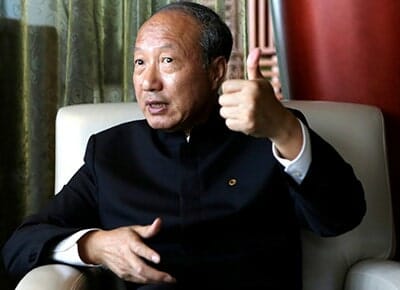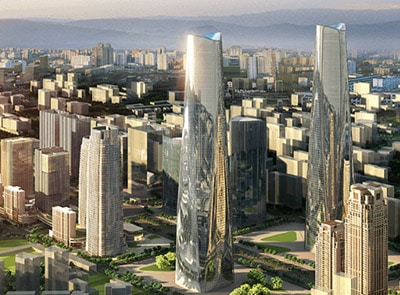
HNA chairman Chen Feng continues to express optimism despite the company’s financial challenges
China’s embattled HNA Group is continuing its series of asset disposals with its sale of an 80 percent stake in an uncompleted Wuhan logistics project to an affiliate of superinvestor Fang Fenglei’s Hopu Capital for RMB 312 million ($45.8 million), according to local real estate news site Guandian.
Recent reports also indicate that the Chinese conglomerate is close to selling a supertall tower project in Hainan to China Poly Group, one of the mainland’s largest developers.
These selloffs are the latest in a string of property divestments both in China and globally as the company seeks to meet its financial obligations after racking up a reported $100 billion in debt. The company is now approaching selloffs of $19 billion worth of assets so far in 2018 following reports of large asset sales in June and July.
Hopu Picks Up Wuhan Logistics Park
In Wuhan, HNA Infrastructure Investment Group, the construction arm of the Hainan-based conglomerate is selling off its Wuhan Lanhai Airport Industry subsidiary to Beijing Hopu Yunde Investment Management, whose ownership points to Hopu Capital, the Beijing private equity firm controlled by Fang Fenglei.
The project carries rights to develop the 656,067 square metre (7 million square foot) site for the purposes of building logistics warehouses. HNA had purchased its 80 percent stake in the industrial real estate project for RMB 379 million in July 2014, with accumulated investment in the project, which includes 20-year land use rights for the site, now said to total RMB 1.2 billion.
HNA reportedly plans to use the proceeds from the project sale to replenish its liquidity. Hopu is also among the major shareholders in logistics heavyweight Global Logistic Properties.
Poly Said in Talks for Hainan Prize

HNA is said to be discussing the sale of one of its Haikou Twin Towers
An even bigger sale may be coming. China Poly Group is reportedly in discussions with HNA about buying the second of the two Haikou Twin Towers, according to a now-deleted Guandian report. The report cited sources close to Poly as saying the state-owned developer intends to acquire the north tower in the 720,000 square metre complex from HNA.
The towers, each of which is said to have required RMB 9 billion in investment, are part of HNA’s master-planned Dayingshan CBD in Haikou.
News reports on Sina.com during March indicated that HNA had put the trophy pair of supertall towers on the market, but there have been no confirmed reports about buyers. HNA responded to Guandian saying only that any future cooperation with third parties would be unveiled through official announcements.
Should the deal go through, it would be the second major Hainan sale for HNA this year. In April, the company sold off the rights to Haihang Shoufu, a high-end housing project near the Twin Towers in Haikou’s Dayingshan CBD, to Guangzhou R&F for $905 million.
The sale reportedly concerns the complex’ 429-metre-tall north tower in the complex. The 340,000 square metre building is the second of the two tallest buildings on Hainan Island, expected to be completed in 2023. The 428-meter-tall main (south) tower is already under construction with completion expected in 2020.
The combined 720,000 square metre complex is expected to include a grade A office space, condominium, retail and and a St. Regis Hotel.
The Latest in a Slate of Selloffs
The news of the two disposals comes on the heels of reports that Hainan Airlines Real Estate is selling Shenzhen Haihang City, a 623,000 square-meter mixed-use complex, for RMB 1.6 billion. This was the third sale of major mainland China properties in 2018. In addition to this and the Haikou housing project, it sold a $456 million project in Shanghai in May.
Since June, the company has offloaded a number of international properties, as well. The company’s sale of a 25 percent stake in Spain’s NH Hotels to Thailand-based hotelier Minor International Plc for $723 million pushed its asset sales this year past $14.5 billion.
In June, news broke that HNA would be selling its $2 billion 245 Park Avenue tower in Manhattan to SL Green Realty. Then in early July, Mapletree announced its acquisition of five Singapore warehouses from HNA for $535 million.
Debt Problems Trigger Credit Freeze
The trouble for HNA started in mid-2017 when large firms buying up overseas properties faced scrutiny from China’s bank regulator and were ordered to assess the “systemic risk” of their acquisitions. Other companies with large property holdings caught up in the regulatory tightening include Fosun, Wanda Group and Anbang, which was subject to a government takeover this year following corruption charges for company chairman Wu Xiaohui.
By the end of 2017, the extent of HNA’s debt was causing problems as credit dried up. The company played down concerns, but by January seven HNA-related companies halted trading, leaving minority investors stuck without means of recouping any of their investments.
When HNA stocks resumed trading in July, they lost more than $3 billion in market capitalization within days. Hainan Airlines, HNA Group’s best-known asset, took the biggest beating, losing 10 percent of its value before plummeting further. In less than two weeks, it has lost 16 percent of its market cap.
Leave a Reply